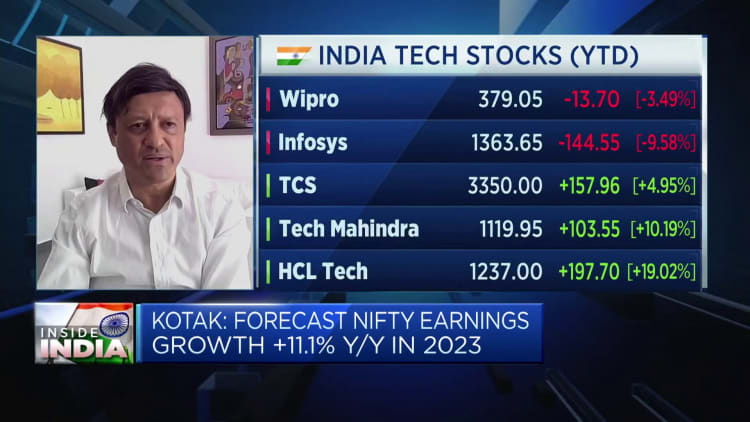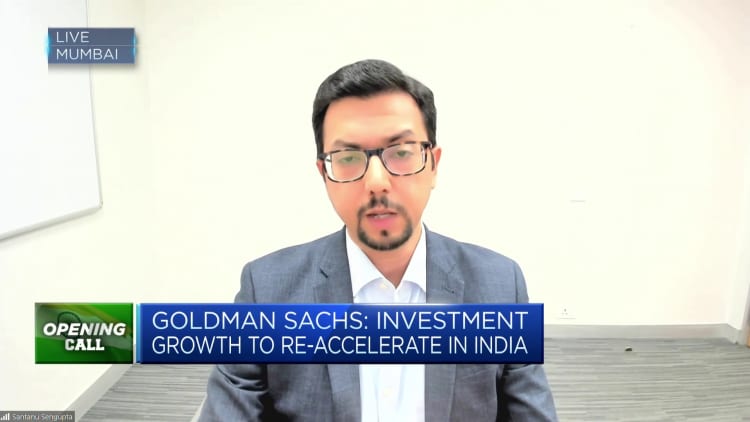Beautiful and colorful aerial view of Mumbai skyline during twilight seen from Currey Road, on February 16, 2022 in Mumbai, India.
Pratik Chorge | Hindustan Times | Getty Images
India’s stock markets have staged record-breaking rallies this year, making the country a favorite among its Asia-Pacific counterparts.
The Nifty 50 index has repeatedly notched fresh all-time highs, reaching yet another peak on Tuesday. The index is set for an eighth year of gains, up more than 15% year-to-date.
Optimism about India’s growth prospects, increased liquidity and greater domestic participation have all contributed to the surge in stock markets. In fact, India’s stock market value has overtaken Hong Kong’s to become the seventh largest in the world.
As of the end of November, the total market capitalization of the National Stock Exchange of India was $3.989 trillion versus Hong Kong’s $3.984 trillion, according to data from the World Federation of Exchanges.
Numbers from the WFE also showed that India’s NSE saw more new stock listings than the HKEX. India’s stock market had 22 new listings vs. Hong Kong’s seven, as of November.
Here are the five reasons why India’s stock markets have reached new highs this year:
Growth prospects
India has been one of South Asia’s fastest growing economies, with expectations only building up for next year.
The world’s most populous country has grown at a consistently strong pace this year, with the most recent reading on third-quarter GDP showing a much higher-than-expected growth rate of 7.6%.
Bets on India driving growth in Asia have also been rising. S&P Global predicted India’s GDP for the fiscal year ending March 2024 hit 6.4%, more than its earlier forecast of 6%.

Strong earnings
The Indian stock market has also shown sound fundamentals and robust earnings, which are expected to grow through 2024.
HSBC forecasts earnings growth of 17.8% for India in 2024 — among the fastest rates in Asia. Sectors such as banks, health care and energy, which have already done well this year are best positioned for 2024, according to HSBC.
Sectors such as autos, retailers, real estate and telecoms were also relatively well positioned for 2024, while fast-moving consumer goods, utilities and chemicals are among those HSBC said were unfavorable.

Domestic participation
There has also been an uptick in domestic participation in Indian stock markets this year, especially in high-growth areas, according to research by HSBC.
“While foreign investors tend to be active in large caps, it is local investors that dominate the small and mid-cap space, which partly explains the outperformance – fund flows into midcap-small schemes of domestic MFs (i.e. mutual funds with a mandate to invest in small/midcaps) have been disproportionately high,” HSBC noted.
It also expects this trend to continue into the next year.

Rate cuts are coming
The Reserve Bank of India held its main lending rate steady at 6.5% last Friday and said its expects the country to grow at a pace of 7% this year. The central bank did warn that inflation, even as it continues to cool, still remains above its target as underlying price pressures were stubborn.
That, however, does not mean market players aren’t expecting rate cuts next year.
“We expect the policy pause to be extended for now and expect 100bp (basis points) of cumulative rate cuts starting from August 2024,” analysts at Nomura wrote in a client note.
Lower lending rates often boost liquidity and boost more risk-taking sentiment in stock markets.
Policy continuity
As India gears up for a big election year in 2024, markets remain optimistic on further policy continuity.
Analysts predict it could be another victory for the ruling nationalist Bharatiya Janata Party, with recent polls and recent state elections showing the right-wing BJP could retain power.
“The ruling Bharatiya Janata Party (BJP) outdid its national and regional rivals at the recently held state elections. This strong run fed expectations of political stability at the upcoming general elections in April/May24, addressing earlier concerns that a weak showing at the state polls might have stoked a fiscally populist agenda in the coming months,” DBS senior economist Radhika Rao said in a client note.

